
The Only SaaS Keyword Research Process That Drives SQLs in 2026
Last Updated: January 2026

Tameem Rahman (AKA The SaaStronaut)
Managing Partner @ TalktheTalk | Helping 7-9 figure tech brands meet buyers in AI search and make SEO profitable. Toronto-based, 200+ happy clients in the last 5 years, 15 employees.
Most SaaS keyword research guides are still teaching you to build "topical authority" with 50 blog posts about "what is [category]" before you even think about bottom-funnel content.
That advice made sense in 2019.
In 2026, it's a waste of your budget.
What Changed
AI now answers top-of-funnel questions instantly. When someone Googles "what is project management software," they get an AI Overview that answers the question in 3 seconds. They never click through to your educational blog post.
That traffic is gone—and it's not coming back.
But here's what AI can't do: make buying decisions for people.
When someone searches "best project management software for remote agencies" or "Monday.com alternatives", they're not looking for a definition. They're looking for a recommendation. And that's where the money is.
This is the BOFU-first keyword research method we use at TalktheTalk. I'm going to show you exactly how to find, prioritize, and dominate the keywords that actually drive demos and signups—not vanity traffic.
The 6 Keyword Categories That Actually Make Money
Forget the traditional keyword research frameworks. In the AI era, there are exactly 6 keyword categories worth targeting for SaaS:
| Category | Example | Why It Converts |
|---|---|---|
| Competitor alternatives | "Salesforce alternatives" | Buyer is actively unhappy with a competitor |
| Product vs. product | "HubSpot vs Pipedrive" | Buyer is in final decision stage |
| Best tool for use case | "best CRM for real estate agents" | Buyer knows what they need, seeking options |
| Best tool for industry | "best accounting software for contractors" | Buyer self-identifies, wants tailored solution |
| Best tool for customer type | "best project management for small teams" | Buyer is qualifying themselves |
| How to solve [problem] | "how to track sales pipeline" | Buyer has pain, needs solution (your product) |
That's it.
These are your money keywords. Everything else—"what is CRM," "benefits of project management," "guide to sales automation"—is now AI fodder. Searchers get their answer in the AI Overview and bounce. You get impressions. You don't get pipeline.
Use this Claude Prompt to Create a Revenue-driven Keyword Strategy
- 1. Drop your website → Claude studies your site, competition, customers & niche
- 2. Get 75-150 keywords → All BOFU/MOFU variations from the categories above
- 3. Upload to Ahrefs → Uncover search volume, KD & CPC instantly
Section Summary
Proof This Works: We Helped TxtCart Land a $500M+ Client With The Same Keyword Targeting Strategy
Theory is nice. Results are better. Let me show you exactly what happens when you execute the BOFU-first strategy correctly.
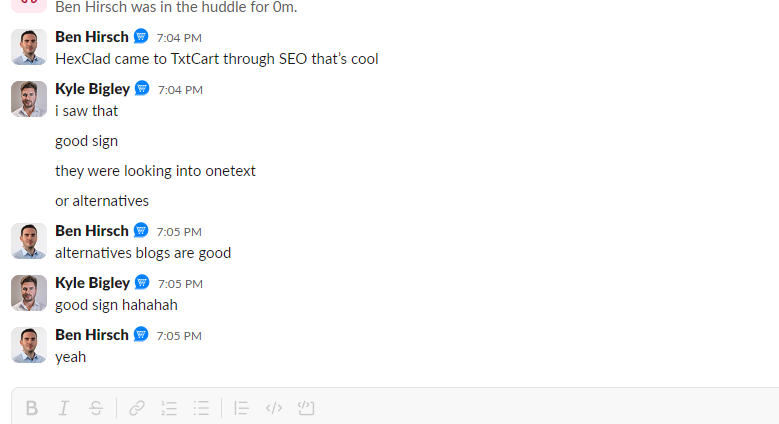
Live Slack conversation: TxtCart's team reacting to HexClad signing up through organic search
TxtCart is a Shopify SMS marketing platform. When they came to us, their previous agency had them ranking for keywords like "how to send video via text message on iPhone."
Useful content for literally nobody who would ever buy an eCommerce SMS platform.
The Problem
Vanity traffic, zero pipeline. Their previous strategy targeted general SMS questions instead of Shopify store owners actively looking for SMS marketing tools. The result? Traffic that never converted.
We flipped the strategy to BOFU-first. The goal: dominate every "[competitor] alternatives" query in the SMS marketing space.
The Results: SERP Domination
Here's what TxtCart now owns:
"Cartloop alternatives" → Featured Snippet

"OneText alternatives" → #1 + AI Overview
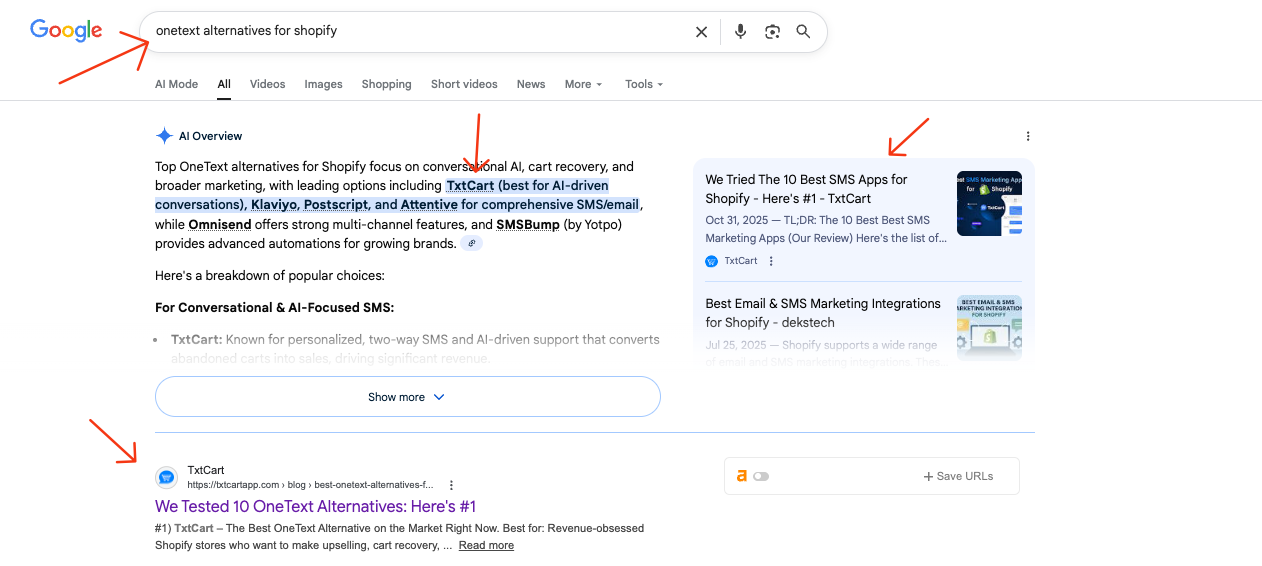
"LiveRecover alternatives" → AI Overview + #1
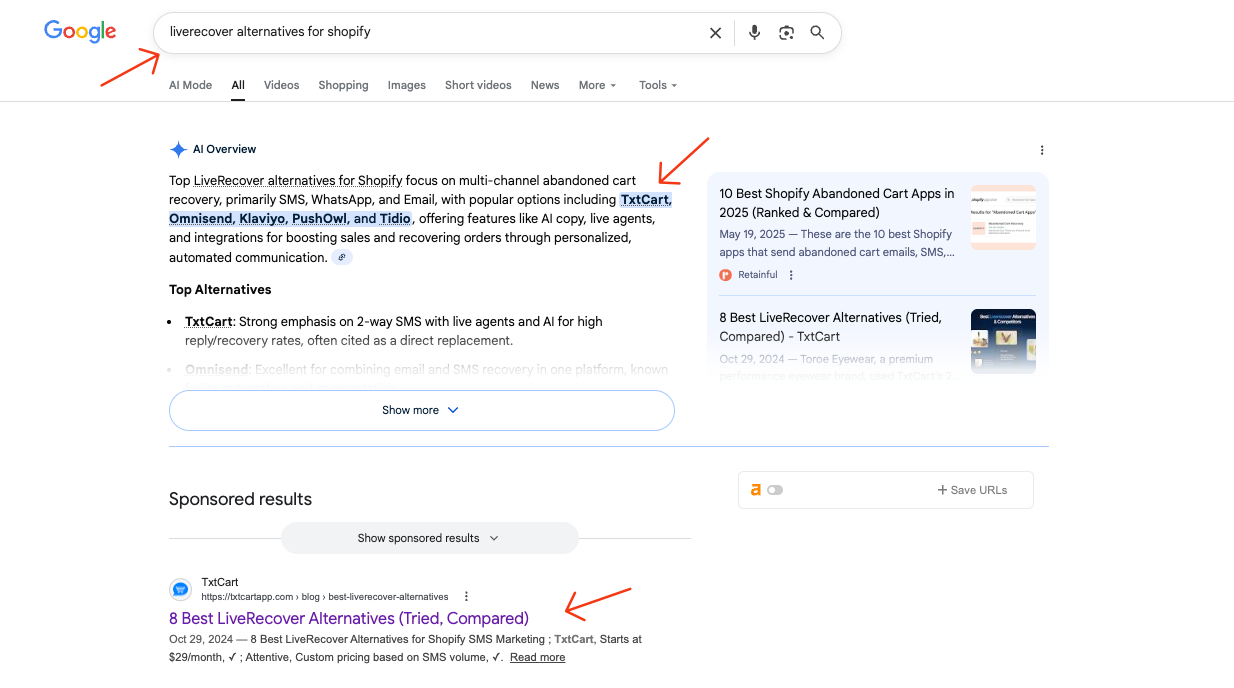
"Best SMS app for Shopify" → AI Overview Lead
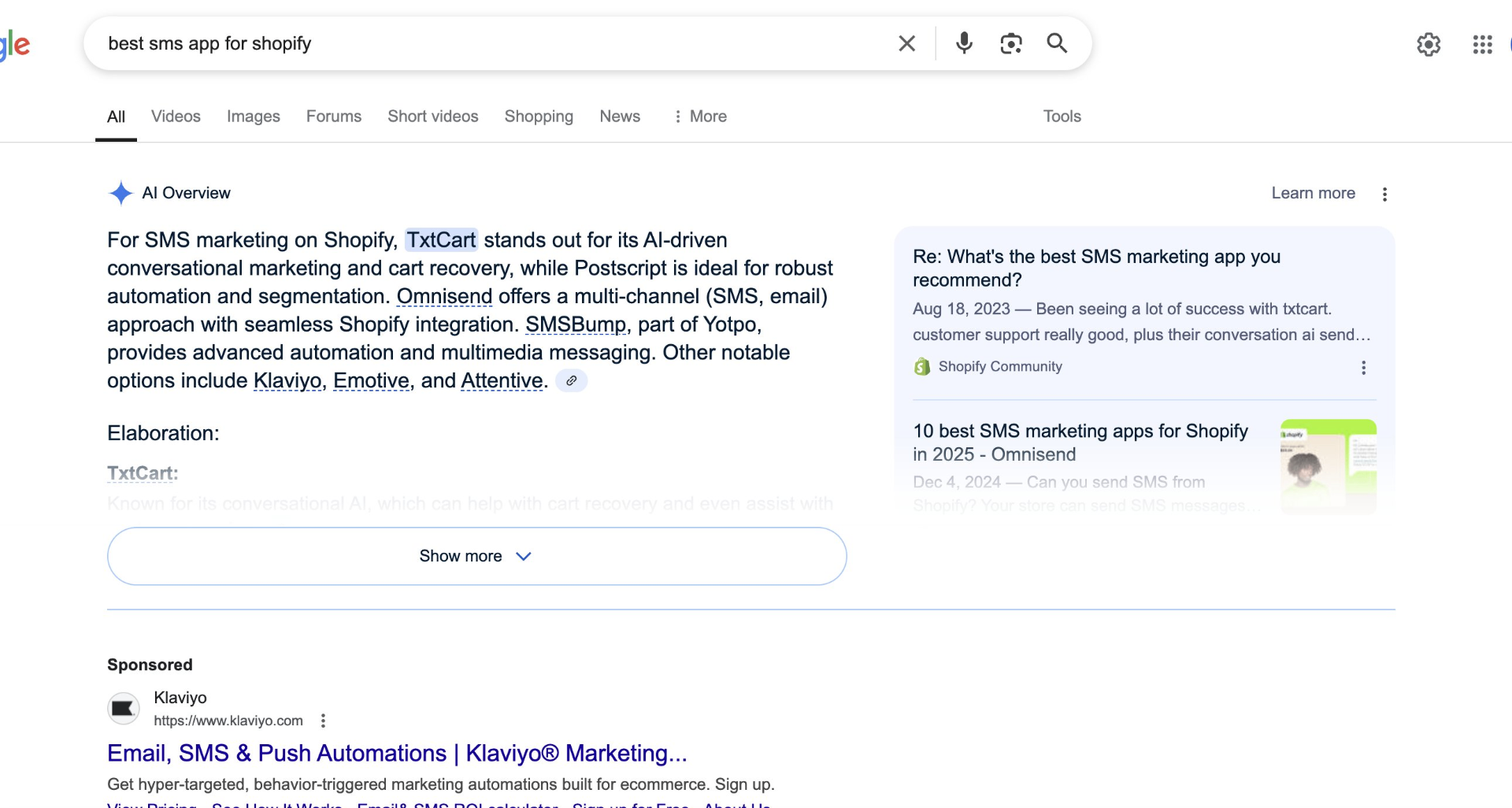
Notice the pattern: TxtCart isn't just ranking in traditional organic results. They're being cited in AI Overviews. That's the GEO strategy in action—when you dominate BOFU across multiple sources, LLMs pick up on that consensus.
The Payoff: HexClad Signs Up
HexClad—the cookware brand with $500M+ in revenue, partnerships with Gordon Ramsay, and a massive Shopify operation—found TxtCart through organic search. They were looking at OneText (a competitor) and found our alternatives article.
One blog post. One BOFU keyword. A $500M+ client in the pipeline.
This is what BOFU-first looks like
We didn't need 100 TOFU posts about "what is SMS marketing." We needed one razor-sharp piece targeting buyers who were already comparing solutions.
That's the difference between traffic and pipeline.
Want results like this?
TalktheTalk runs SEO sprints specifically designed to capture BOFU keywords and get you cited in AI Overviews. No 12-month retainers. No vanity traffic. Just pipeline.
Book a Strategy Call ↗Section Summary
How to Prioritize: The Search Volume × Difficulty Matrix
Once you've identified keywords in those 6 categories, you need to prioritize ruthlessly. Here's the formula:
Go for highest search volume + lowest keyword difficulty first.
Pull your keyword list into Ahrefs (or SEMrush). Sort by:
- Search volume (descending)
- Keyword difficulty (ascending)
Your top priorities are high-volume, low-difficulty keywords. These are your quick wins—terms where you can realistically rank in 60-90 days with solid content and some targeted outreach.
Validate with CPC
High CPC = advertisers pay real money for this traffic = it converts. If a keyword has 500 monthly searches and a $15 CPC, that's a money term. If it has 5,000 searches and a $0.50 CPC, it's probably informational garbage.
Here's how I'd stack-rank a hypothetical keyword list:
| Keyword | Volume | KD | CPC | Priority |
|---|---|---|---|---|
| "Asana alternatives" | 4,400 | 24 | $12.00 | 🔥 Do first |
| "best project management for agencies" | 1,200 | 18 | $8.50 | 🔥 Do first |
| "Monday vs Asana" | 2,900 | 31 | $6.00 | ✓ Second wave |
| "how to manage remote team tasks" | 800 | 22 | $4.00 | ✓ Second wave |
| "what is project management" | 12,000 | 67 | $1.20 | ✗ Skip |
Work down the list. Don't move to wave 2 until wave 1 is ranking.
Section Summary
The Nuanced Take on TOFU: It's About Timing, Not Elimination
There are two camps right now:
Camp 1
"TOFU still matters, keep building topical authority."
(These people are running 2019 playbooks.)
Camp 2
"TOFU is dead, never create educational content."
(Overreaction.)
Both are wrong. Here's the reality:
TOFU has a place—but it's later in the priority stack, not first.
The reason: AI doesn't just answer questions. It anticipates that users will need tools.
Real example I found (see my LinkedIn post):
Someone searched "can you use one virtual office address for multiple businesses?"
This is a classic TOFU question. Informational. No buying intent. Pre-AI, you'd rank a blog post and hope they remember you later.
Here's what happened in 2026: Google's AI Overview answered the question directly—yes, you can—and then immediately recommended DaVinci, a company that provides virtual office addresses.
The searcher got their answer AND a product recommendation in the same response.
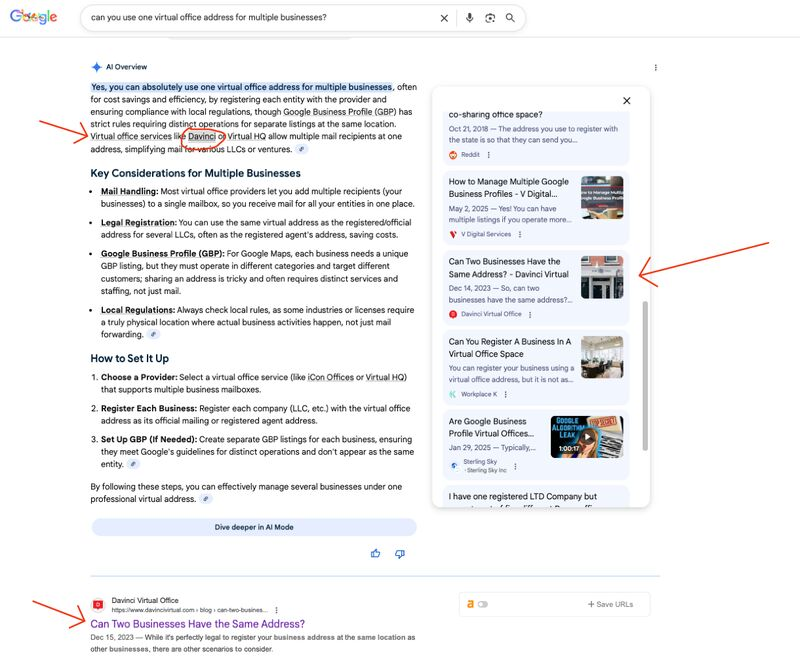
AI Overview answering a TOFU question while recommending a product (DaVinci Virtual Office)
The priority stack
- First, dominate BOFU (alternatives, comparisons, best-for keywords)
- Then, own MOFU (problem-aware keywords where solutions are implied)
- Finally, selectively target TOFU where your product naturally fits the answer
Don't skip steps 1 and 2 to chase step 3.
Section Summary
The Keyword Research Process: Step by Step
Here's exactly how to run this for your SaaS:
Build Your Seed List
Open a spreadsheet. Create columns for each money keyword category:
- • [Competitor] alternatives
- • [Your product] vs [Competitor]
- • Best [category] for [use case]
- • Best [category] for [industry]
- • Best [category] for [customer type]
- • How to [solve problem your product solves]
Fill in every variation you can think of. For a CRM company, this might be 50-100 keywords across all categories.
Generate 75-150 BOFU keywords instantly
Click to open Claude with a ready-to-use prompt
Open in ClaudePull Data from Ahrefs
Dump your seed list into Ahrefs Keywords Explorer. Export with:
- Search volume
- Keyword difficulty
- CPC
- SERP features (note which have AI Overviews)
Pro Tip: Connect Ahrefs to Claude via MCP
If you want to supercharge this process, you can connect Ahrefs directly to Claude using the Ahrefs MCP integration. This lets you pull keyword data, analyze competitors, and build your keyword matrix all within the Claude interface—no manual exports needed.
Score and Prioritize
Add a "Priority Score" column. Simple formula:
Priority = (Volume × CPC) / Keyword Difficulty
Higher score = do it first. Or just eyeball it: high volume, low difficulty, high CPC = 🔥
Map to Content
For each priority keyword, decide:
- Do we need to create a listicle on our site? (Usually yes)
- Which existing listicles rank for this? (List URLs)
- Can we get added to those listicles? (Outreach opportunity)
Section Summary
The Two-Part Execution: Own + Infiltrate
Finding the keywords isn't enough. You need a two-part strategy to actually capture them:
Create Your Own Listicles
For every money keyword, you create content on your site.
- →"Salesforce alternatives" → You publish "10 Best Salesforce Alternatives for [Your ICP]"
- →"Best CRM for real estate" → You publish "7 Best CRMs for Real Estate Agents in 2026"
Yes, you include yourself in the listicle. Usually position 1 or 2. This isn't sleazy—it's expected. Every SaaS company does this. Buyers know it. They read it anyway because they want options.
The key to trust
Make the content genuinely useful. Don't just list 10 competitors and trash them. Give honest pros and cons. Show you actually understand the space. This builds trust and performs better in AI citations because LLMs favor comprehensive, balanced content. For tips on making your content stand out, see our headline vs title guide.
Get Mentioned in Competing Listicles
Here's where most SaaS brands stop. They publish their own listicle and hope it ranks.
That's half the strategy.
The other half: get mentioned in the other listicles already ranking for that keyword.
How to do it:
- Search your target keyword
- List every article ranking on page 1 that isn't yours
- Check if you're mentioned → If yes, great. If no, reach out.
- Offer the publisher a compelling reason to add you (free trial, affiliate rev share, exclusive data, etc.)
Why this matters for AI
LLMs like ChatGPT and Claude build recommendations based on co-occurrence—how often your brand appears alongside a query across multiple sources. If you're only mentioned in your own content, you're one voice. If you're mentioned in 8 different listicles for "best CRM for real estate," that's a consensus. The AI will cite you.
What Most Keyword Research Guides Get Wrong
Before you go, let's kill some bad advice that's still floating around:
"Build topical authority first"
This was true when Google needed content clusters to understand your site. Now AI understands context instantly. You can rank for BOFU terms without 50 supporting TOFU posts. Topical authority is a nice-to-have, not a prerequisite. This is one of the biggest SEO mistakes we still see agencies push.
"Target high-volume keywords"
Volume means nothing without intent. A 50-volume keyword like "best SMS marketing platform for Shopify Plus" beats a 10,000-volume keyword like "what is SMS marketing" every time—because the first person is buying and the second is just curious.
"Avoid high-KD keywords"
Keyword difficulty is a rough estimate. Many "high difficulty" BOFU keywords are actually easier than they look because most competitors haven't optimized for AI citations. If you can get mentioned in multiple sources (the infiltration strategy), you can compete.
The Bottom Line
In 2026, keyword research for SaaS is simple:
- Target BOFU first. Competitor alternatives, product comparisons, best-for queries.
- Prioritize by impact. High volume × high CPC ÷ low difficulty = your hit list.
- Own and infiltrate. Create your own content AND get mentioned everywhere else. (See our full link building guide for how to get into those listicles.)
- Ignore TOFU until you've captured every money keyword in your space.
- Structure your site intentionally. Build pages that map to buyer stages—see our website architecture guide for the full blueprint.
This is how you get cited in AI Overviews, recommended by LLMs, and—most importantly—how you turn SEO into a pipeline channel instead of a vanity metrics dashboard.
Need to know which metrics actually prove SEO is working? Read our complete framework: SaaS SEO KPIs: The Only Metrics That Actually Matter
Section Summary
Ready to Dominate AI Search Results?
Get a free AI Visibility Audit and discover how your SaaS brand compares to competitors in Google and AI answers.
Book Your Free Strategy Call ↗Continue Reading
![The Complete SaaS Website Architecture Guide [$10M+ ARR Best Practices]](/assets/thumbnail-saas-website-architecture-DnWAStN1.jpg)
The Complete SaaS Website Architecture Guide [$10M+ ARR Best Practices]
Your SaaS website isn't a brochure. Here's the exact architecture that captures traffic at every stage of the buyer journey and turns visitors into revenue.
Read article
SaaS Link Building for the AI Search Era (F*ck Guest Posts)
Guest posts are dead. Good riddance. Here's what actually builds authority and drives rankings in 2026—strategies that work for both Google and AI search.
Read article
SaaS SEO KPIs: 9 Metrics That Matter (Ignore the Other 40)
Stop tracking 15 different SEO metrics. I've audited over 100 SaaS companies—here are the only 9 KPIs that connect to revenue and when to track each one.
Read article